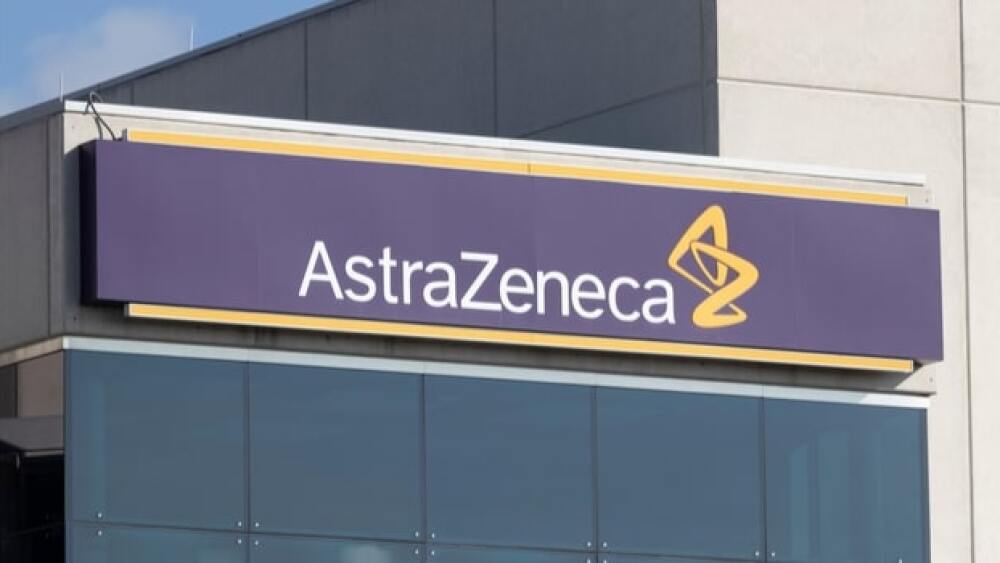After five years of follow-up, AstraZeneca’s Tagrisso reduces the risk of death by 51% as compared with placebo in EGFR-mutated NSCLC patients, according to Phase III ADAURA trial results.
Pictured: AstraZeneca sign on building/Courtesy of Jonathan Weiss/Shutterstock
Final results from the Phase III ADAURA study showed that AstraZeneca’s Tagrisso (osimertinib), when given after surgery, could strongly improve survival among post-operative adult non-small cell lung cancer patients carrying mutations in the EGFR gene, according to data presented Sunday at the 2023 American Society of Clinical Oncology annual meeting.
After five years of follow-up, patients treated with AstraZeneca’s EGFR inhibitor saw a 51% drop in the risk of death as compared with placebo.
Moreover, in the complete study population, which included patients with stage IB through IIIA non-small cell lung cancer (NSCLC), 88% of the Tagrisso-treated patients were still alive five years after surgery, whereas only 78% of placebo comparators had survived until this time point. ADAURA found similar survival figures in the subgroup of patients with stage II through IIIA NSCLC.
These data were also published Sunday in the New England Journal of Medicine.
Tagrisso is an EGFR inhibitor that binds to certain mutant forms of the protein, in turn disrupting the uncontrollable and hyperactive division of cancer cells. The drug is approved for the first-line treatment of metastatic NSCLC carrying specific EGFR mutations. Tagrisso is also already approved for ADAURA’s study population.
In a statement, Nathan Pennell, an associate professor and director of the Lung Cancer Medical Oncology Program at the Cleveland Clinic Taussig Cancer Institute, called these findings “a first for the lung cancer field,” demonstrating that adjuvant treatment with Tagrisso “unequivocally improves survival in people with resected EGFR-mutated non-small cell lung cancer.”
“This should be the new standard of care for these patients,” Pennell said.
ADAURA is a randomized, double-blinded and placebo-controlled global trial with more than 680 NSCLC patients enrolled. Post-operative patients categorized with stage IB, II or IIIA disease and with laboratory-confirmed EGFR mutations were eligible.
The primary efficacy endpoint of ADAURA was disease-free survival. In May 2020, AstraZeneca released detailed data from ADAURA, showing that compared with placebo, adjuvant Tagrisso cut the risk of disease recurrence or death by 83% in patients with stage II and IIIA NSCLC, and by 79% in those with stage IB through IIIA disease.
At the European Society of Medical Oncology (ESMO) Congress in September 2022, the company posted follow-up data from ADAURA, demonstrating that after two more years of follow-up, adjuvant Tagrisso could reduce the risk of recurrence or death by 77% in those with stage II and IIIA disease, and by 73% in the overall study population.
ADAURA was originally scheduled for an initial readout in 2022, but an Independent Data Monitoring Committee found evidence of Tagrisso’s “overwhelming efficacy” in April 2020 and recommended to unblind the study two years early.
The findings at ASCO 2023 earned similarly high praise. Roy Herbst, deputy director of the Yale Cancer Center and ADAURA lead author, said “the overall survival benefit instills confidence that adjuvant osimertinib is the standard of care” in EGFR-mutated NSCLC.
Tristan Manalac is an independent science writer based in metro Manila, Philippines. He can be reached at tristan@tristanmanalac.com or tristan.manalac@biospace.com.






